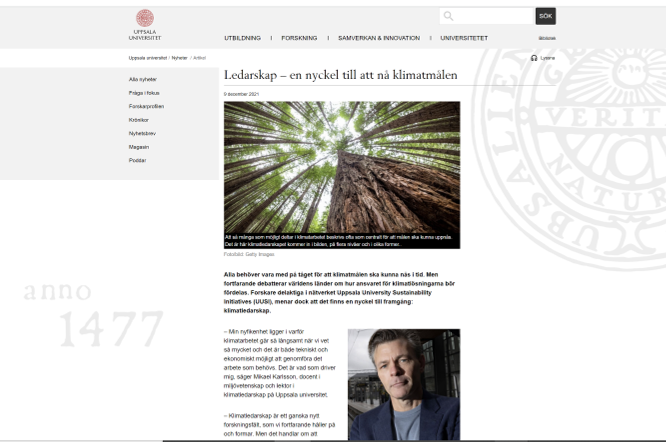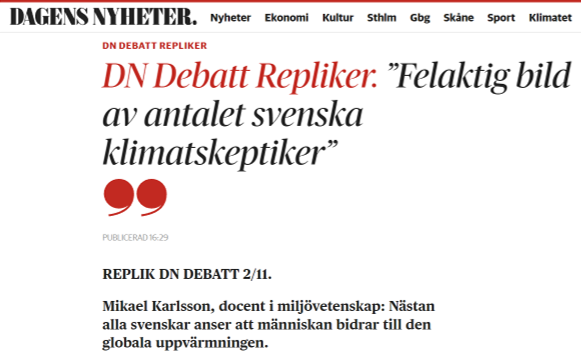

In a recently published article in Climate Policy, Daniel Lindvall and Mikael Karlsson from CCL explore the strengths and weaknesses of democracy in mitigating climate change.
Democracy put in question by greenhouse gas emissions
Democratic governments worldwide fail to reduce emissions in line with the Paris Agreement. As a result, a discussion has emerged on the capacity of democracies to effectively reduce greenhouse gas emissions. Some argue that democracies are unfit to tackle challenges of climate change as democratic decision-making is restricted in time and space by the election cycles and the geographic constraints of the nation state. Interest groups and so-called ‘veto players’ have captured the policy process, while the electorate lacks scientific literacy. These claims have led a few climate scientists to suggest that democracy should be restricted or even put on hold. Others counter that the problem is not democracy as such, but rather the incapacity of existing liberal democratic institutions to channel the interests of citizens. Hence, there is a need to deepen and advance democracy.
To bring clarity to these issues, Lindvall and Karlsson reviewed 72 peer-reviewed articles and book chapters published over the last two decades. The chosen articles reported correlation analyses between indicators of democracy and climate policy performances. Their review confirms that democracies tend to generate better climate policy outputs than autocracies, in terms of adoption of policies, laws and regulations. However, they find weak empirical evidence for an association between democratic development and CO2 emission reductions.
Corruption and income inequalities foster carbon intense economic growth
A reason for the unconvincing performance of democracies is the correlation between economic growth and democratization. Most studies suggest that citizens can use democracy to alleviate the carbon impact of growth. However, this conclusion is only significant in high-income countries with low-corruption. In developing countries with rapid growth, democratic qualities do not seem to have any noteworthy effect on the reduction of growth-generated emissions. A major quest for humanity is thus to find solutions to combat poverty and in parallel advance and sustain human freedom, without carbon-intensive economic development.
Income inequality is another factor that can generate both higher emissions and undermine the capacity of democracy to deliver effective climate polices. Citizens in countries with high levels of income inequality tend to oppose emission reduction policies. They believe that costs for such measures will be unfairly distributed. Furthermore, high income earners have extremely carbon-intensive lifestyles and may be unwilling to support policies that would restrain their lifestyle.
Fossil fuel interests can weaken climate policy performance
A third factor explaining the underperformance of democracies is institutional capacity and corruption. Democracies suffering from corruption and weak state institutions can present ambitious climate policies. However, they tend to implement such policies poorly. The article highlights in this context that corruption and policy capture are often caused by fossil fuel interests, symptoms associated with the so-called ‘rentier effects’. Fossil fuel extraction tend accordingly to negatively influence both institutional capacity, democratic qualities and climate policy performance.
Synergy of renewable technologies and democracy has potential
Lindvall and Karlsson conclude accordingly that with deployment of renewable energy solutions, economic activities can increasingly be disconnected from fossil fuel dependence. This reduces the political influence of the fossil fuel industry. This process could also enhance the capacity of democracies to accelerate the energy transition and reduce emission levels. Policies aiming at combating corruption and accomplishing a fairer wealth distribution, could also help to unleash the transformative capacity of democracy towards a low-carbon future.

None of the studies identified in the review provides any evidence that would suggest that autocratic regimes perform better than democracies. To conclude, the insufficient climate policy performance of present democracies should rather be seen as an argument to vitalize and strengthen democracy than to restrict it.
The article was developed as a part of the Formas funded research project Wicked Problem Governance and the Formas and Mistra funded research project Fairtrans.
Read the full article here:
Lindvall D and Karlsson M Exploring the democracy-climate nexus: a review of correlations between democracy and climate policy performance. Climate Policy 2023 https://doi.org/10.1080/14693062.2023.2256697




